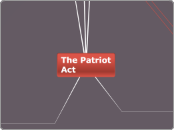The Patriot Act
The Legal Foundations
The U.S. Patriot Act was signed into law by President George W. Bush on October 26, 2001.
Congressional bill 109-170 "Amends the Uniting and Strengthening America by Providing Appropriate Tools Required to Intercept and Obstruct Terrorism (USA PATRIOT ACT) Act of 2001 to extend from February 3, 2006, to March 10, 2006, provisions of that Act and the "lone wolf" provision of the Intelligence Reform and Terrorism Prevention Act of 2004."
Video regarding a case using the US Patriot Act
Amendment I: "Congress shall make no law respecting an establishment of religion, or prohibiting the free exercise thereof; or abridging the freedom of speech, or of the press; or the right of the people peaceably to assemble, and to petition the government for a redress of grievances."
US Patriot Act: "Freedom of association: To assist terror investigation, the government may monitor religious and political institutions without suspecting criminal activity."
US Constitution: Amendment IV: "The right of the people to be secure in their persons, houses, papers, and effects, against unreasonable searches and seizures, shall not be violated, and no warrants shall issue, but upon probable cause, supported by oath or affirmation, and particularly describing the place to be searched, and the persons or things to be seized."
U.S. Patriot Act:
Freedom from unreasonable searches: "The government may search and seize Americans' papers and effects without probable cause to assist terror investigation."
Amendment VI: "In all criminal prosecutions, the accused shall enjoy the right to a speedy and public trial, by an impartial jury of the state and district wherein the crime shall have been committed, which district shall have been previously ascertained by law, and to be informed of the nature and cause of the accusation; to be confronted with the witnesses against him; to have compulsory process for obtaining witnesses in his favor, and to have the assistance of counsel for his defense."
US Patriot Act: "Right to legal representation: The government may monitor conversations between attorneys and clients in federal prisons and deny lawyers to Americans accused of crimes."
Interest Groups
For:so that Americans can be promised a safer country
Center for Security Policy
RAND:---> Plans to: long-range planning of future weapons.
Against: After the Patriot Act's passage, the FBI quickly targeted the Muslim community for intensive surveillance
Islamic Society of North America
The National Coalition to Repeal the Patriot Act
The American Muslim Union
The Muslim American Society
The Muslim Students Association of the United States and Canada.
Concerned Citizens Against The Patriot Act
Goals
Anti-money-laundering to prevent terrorism
Protect Border
Consequences to the Patriot Act
Positive outcome: Secures The United States Better than before 9/11.
Outcomes
Enhanced domestic security against terrorism
Enhanced Security Surveillance
Border Security is more secure.
Basis for Act
USA PATRIOT ACT stands for Uniting and Strengthening America by Providing Appropriate Tools Required to Intercept and Obstruct Terrorism, Act.
To punish terrorist acts in the United States and around the world, to enhance law enforcement investigatory tools, and other purposes
Allows law enforcement officials to obtain a search warrant anywhere a terrorist-related activity occurred.
Allows law enforcement to use surveillance against more crimes of terror.
Uniting and Strengthening America by giving the correct sequence of laws in this act to prevent illegal aliens/ terrorists out of the United States of America.
